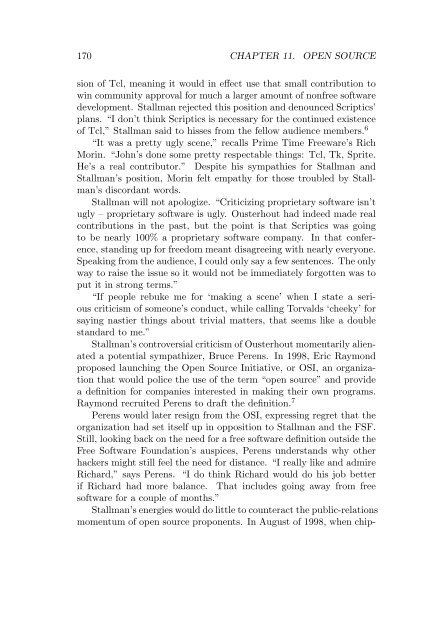Create successful ePaper yourself
Turn your PDF publications into a flip-book with our unique Google optimized e-Paper software.
170 CHAPTER 11. OPEN SOURCE<br />
sion of Tcl, meaning it would in effect use that small contribution to<br />
win community approval for much a larger amount of nonfree software<br />
development. Stallman rejected this position and denounced Scriptics’<br />
plans. “I don’t think Scriptics is necessary for the continued existence<br />
of Tcl,” Stallman said to hisses from the fellow audience members. 6<br />
“It was a pretty ugly scene,” recalls Prime Time Freeware’s Rich<br />
Morin. “John’s done some pretty respectable things: Tcl, Tk, Sprite.<br />
He’s a real contributor.” Despite his sympathies for Stallman and<br />
Stallman’s position, Morin felt empathy for those troubled by Stallman’s<br />
discordant words.<br />
Stallman will not apologize. “Criticizing proprietary software isn’t<br />
ugly – proprietary software is ugly. Ousterhout had indeed made real<br />
contributions in the past, but the point is that Scriptics was going<br />
to be nearly 100% a proprietary software company. In that conference,<br />
standing up for freedom meant disagreeing with nearly everyone.<br />
Speaking from the audience, I could only say a few sentences. The only<br />
way to raise the issue so it would not be immediately forgotten was to<br />
put it in strong terms.”<br />
“If people rebuke me for ‘making a scene’ when I state a serious<br />
criticism of someone’s conduct, while calling Torvalds ‘cheeky’ for<br />
saying nastier things about trivial matters, that seems like a double<br />
standard to me.”<br />
Stallman’s controversial criticism of Ousterhout momentarily alienated<br />
a potential sympathizer, Bruce Perens. In 1998, Eric Raymond<br />
proposed launching the Open Source Initiative, or OSI, an organization<br />
that would police the use of the term “open source” and provide<br />
a definition for companies interested in making their own programs.<br />
Raymond recruited Perens to draft the definition. 7<br />
Perens would later resign from the OSI, expressing regret that the<br />
organization had set itself up in opposition to Stallman and the FSF.<br />
Still, looking back on the need for a free software definition outside the<br />
Free Software Foundation’s auspices, Perens understands why other<br />
hackers might still feel the need for distance. “I really like and admire<br />
Richard,” says Perens. “I do think Richard would do his job better<br />
if Richard had more balance. That includes going away from free<br />
software for a couple of months.”<br />
Stallman’s energies would do little to counteract the public-relations<br />
momentum of open source proponents. In August of 1998, when chip-


